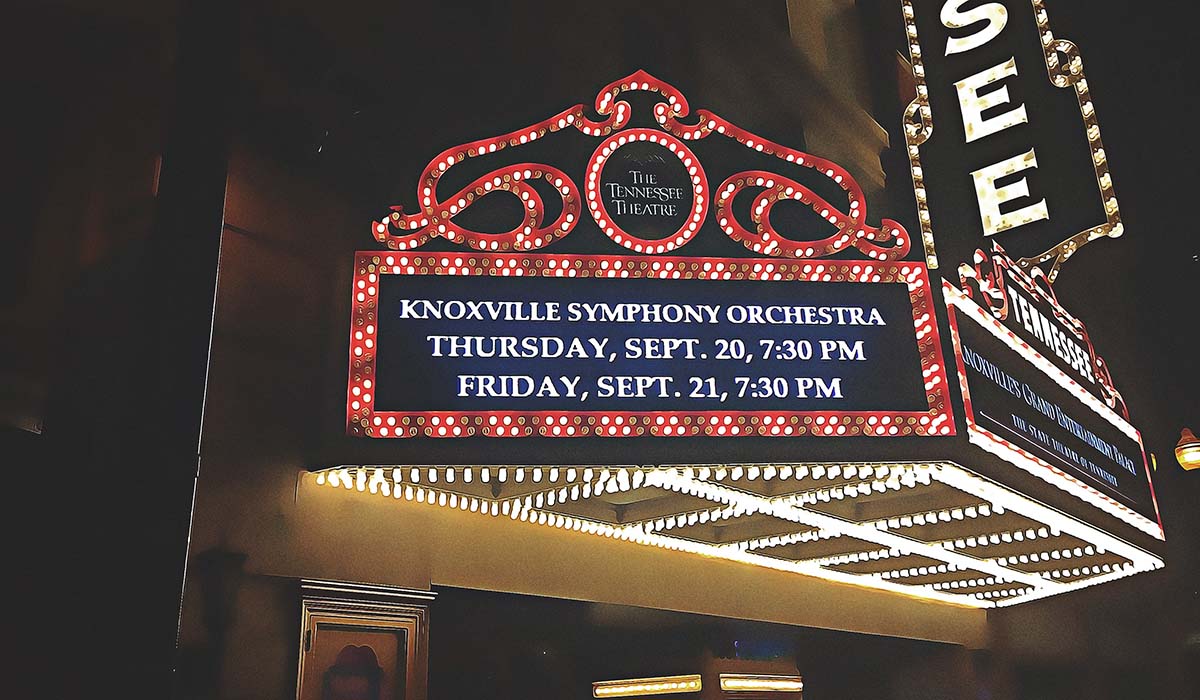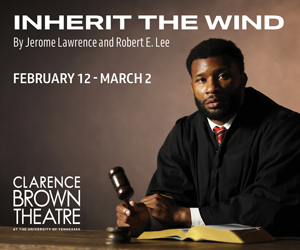The Knoxville Symphony Orchestra released the news of their 2019-20 season programming last month, planting the seeds of excitement in Knoxville classical music listeners. KSO music director and conductor Aram Demirjian took the time to answer a few questions on next season’s concert lineup, including the Beethoven 250 celebration, and to offer his own take on what will be in store for the KSO’s audience.
——————————
Alan Sherrod: Before we jump into the KSO’s month-by-month schedule for 2019-20, let’s talk a bit about the Ludwig van Beethoven 250th Birthday celebration theme that runs throughout next season—a focus that is being embraced by orchestras all over the world. To be honest, though, Beethoven is not exactly in danger of sliding into obscurity without a celebration, regularly being named—by those who count such things—as the most-performed composer in classical music.
Programming-wise, you’ve got two of the symphonies—No. 3 and No. 7—plus the Piano Concerto No. 4 and the Prometheus Overture on the Masterworks Series, not to mention an all-Beethoven concert on the Chamber Classics. The topic of Beethoven tempos was a pretty hot one a few years back. Is there anything new we can learn from this focus on Beethoven, or should we just sit back and enjoy? What would you want an average listener to come away with?
Certainly, no one can argue that Beethoven is under-programmed! That said, an anniversary this significant for a composer this central to the symphonic world can hardly be overlooked, especially for an orchestra of our size, which can sometimes go a decade between performances of certain Beethoven symphonies (see ‘Eroica’).
Alan Sherrod: On September’s season-opening concert, you’re ending with Gustav Holst’s orchestral suite, The Planets. Given the work’s majestic and evocative sonic presence, what went into your decision to preface it with what seems to be an intentional arc—Strauss’ On the Beautiful Blue Danube, Missy Mazzoli’s rhythmic and textural These Worlds in Us, and the Stokowski orchestration of Debussy’s Clair de Lune?
We begin earthbound, with Strauss’s Blue Danube waltzes (which also certainly has its space associations), and then through Mazzoli, Debussy, and Holst, we simultaneously move metaphorically further away from our physical world and toward our interior world of emotion, memory, and spirituality. As is increasingly the case, other art forms assume heightened importance in our performances. Mazzoli’s “These Worlds in Us” and Debussy’s “Clair de lune” were each inspired by poems that I hope to have recited from stage, and “The Planets” will have a strong visual component, as we are hoping to show footage from NASA’s Jet Propulsion Laboratory.
Alan Sherrod: In the last two seasons we’ve heard the KSO in Dvorak’s Symphonies No. 8 and No. 9; in October you’ve programmed Dvorak’s 7 to complete the trio of his most important symphonies. Do you have plans for the cycle?
And you’ve got the Grieg Piano Concerto on the program. I believe it has been some time since the KSO performed it.
No plans for a Dvorak cycle at this time, but thanks for planting the idea in my head! In fact, it was not my intention to program a Dvorak symphony in each season I’ve been here thus far — it happened quite organically for the simple reason that Dvorak is incredibly satisfying to listen to, and orchestras tend to love playing it. I’ve observed that we always grow as an ensemble whenever we play Dvorak, which is a good incentive to keep programming it. Grieg’s Piano Concerto hasn’t come up since 2015, so not too much time has passed, but it’s always interesting to hear a new interpretation of a classic, and Natasha Paremski has long been someone I’ve wanted to bring to Knoxville.
Alan Sherrod: On the November Masterworks, as part of the Beethoven 250, you’re bookending the concert with Beethoven’s Overture to The Creatures of Prometheus, Op. 43, and his Symphony No. 7, a work you conducted on your KSO audition concert in 2016. In between, is Avner Dorman’s Spices, Perfumes, Toxins!, something of a concerto for percussion duo and winds—featuring Knoxville-based Nief-Norf.
Aram Demirjian:
Beethoven’s Seventh is somewhat of a ‘party piece’ for me — I can’t get enough of it, and part of the purpose of this program is to demonstrate why its rhythmic brilliance is such a source of fascination for me. Also, as I’m sure you recall, there was a snowstorm back in 2016 when I conducted it last, and I’m eager to share the experience with more people!
As our audience is hopefully realizing by now, I view it as a key part of our artistic vision to collaborate with other artistic institutions in Knoxville. Andy Bliss and I became friends very soon after I arrived in Knoxville, and we’ve continually bonded over our love for new music and thirst for breaking with convention. I think Dorman’s concerto is a good aesthetic middle-ground between the artistic expectations of our audience and Nief-Norf’s, and it hopefully will plant the seed for more collaborations in the future.

Alan Sherrod: After the warmth and good cheer of the Holidays, January tends to snap us back into reality, particularly if cold weather is in store. If I’m not mistaken, this concert will offer the first Mahler symphony of your tenure with the KSO—the Symphony No. 1 “Titan”. Are you planning on the cycle as your predecessor did?
Mahler’s symphonies are essential to the symphonic repertoire, and I love them dearly. This is not only my first time conducting a Mahler symphony in Knoxville, but it’s also my first time conducting a Mahler symphony EVER, and that it took until now was intentional. For a piece this massive, I wanted to make sure I had built up a strong foundation of trust and familiarity with both the audience and the orchestra so that we can enter back into the world of Mahler with a sense of wonder and discovery, and without trepidation. Again, no plans for a cycle right now, but I imagine it won’t be the last time we program a Mahler symphony.

Alan Sherrod: In February, Bella Hristova will be joining you and the orchestra for Florence Price’s Violin Concerto No. 1. Wasn’t this one of Price’s unknown works that was discovered by accident in her old summer home several years ago?
This concerto was among the works of Price to be rediscovered in 2009 in an abandoned house in St. Anne, Illinois, which turned out to be Price’s summer home. Price’s music has enjoyed a well-deserved resurgence in the last few years as there has been an overdue emphasis in the orchestral world on diversity and representation in programming. That Price shares this program with Beethoven — arguably the most-programmed composer of all — will surely lead to some interesting and important conversations that I look forward to engaging in.
Alan Sherrod: The March Masterworks is a re-programming of the concert that led to the orchestra’s inclusion in the SHIFT Festival 2020 at the Kennedy Center on March 27. What does this kind of exposure mean for the future of the KSO?
Being invited to the SHIFT Festival is a supreme credit to every member of our organization, from the musicians to the staff and the board, because the invitation to this festival is based on both artistic excellence and community engagement. It’s something all Knoxvillians can be proud of because we would not be in a position to be featured on a national stage if we did not have such an enthusiastic community supporting us at home. I hope that nationally, the KSO will begin to be viewed as a model for what is possible for a symphony orchestra from a modestly-sized city. I also hope this will build enthusiasm for the Symphony at home because as we will demonstrate in DC, the excellence of our artistic institutions amplifies the excellence of our city.
[Click here for more detailed information on the KSO’s participation in the SHIFT Festival 2020]
Alan Sherrod: Guest conductor Francesco Lecce-Chong is taking the April Masterworks, including Beethoven’s Piano Concerto No. 4 with pianist Zhenni Li, and Sibelius Symphony No. 2. If I’m not mistaken, the Sibelius 2 has not been performed recently by the KSO.
We are continually trying to keep track of what our audience hasn’t heard in a long time, and in the case of Sibelius Second, there was vocal enthusiasm from some of our musicians to bring it back, too. I am happy Francesco was willing to take it on — he’s an exciting young conductor.

Alan Sherrod: To close out the season in May, you’ve got violinist Philippe Quint coming for the World Premiere of Michael Schachter’s Violin Concerto: Cycle of Life. With Tchaikovsky’s 4th, that’s quite an event, quite a concert.
When I first learned about Richard Jolley’s massive art installation “Cycle of Life” at the KMA, with its seven-part structure and evocative subject-matter, I thought, “This is begging to be turned into a piece of music.” This is the first large-scale commission the KSO has taken on in many decades, and for a project of this scope, I called on two of my most trusted colleagues, Michael and Philippe, who already have somewhat of a relationship with the KSO. This piece will be the culmination of many years of friendship and musical kinship with each of them, and it also gives the KSO the chance to enter into meaningful collaboration with another leading artistic institution in Knoxville, the KMA. “Cycle of Life” is about life’s personal and universal journey, which I hope will link well to Tchaikovsky’s Fourth Symphony, which deals in questions of Fate.
Tickets and Information on Knoxville Symphony Orchestra concerts
For 2019-20 Season Subscription Inquiries, telephone 865-291-3310







